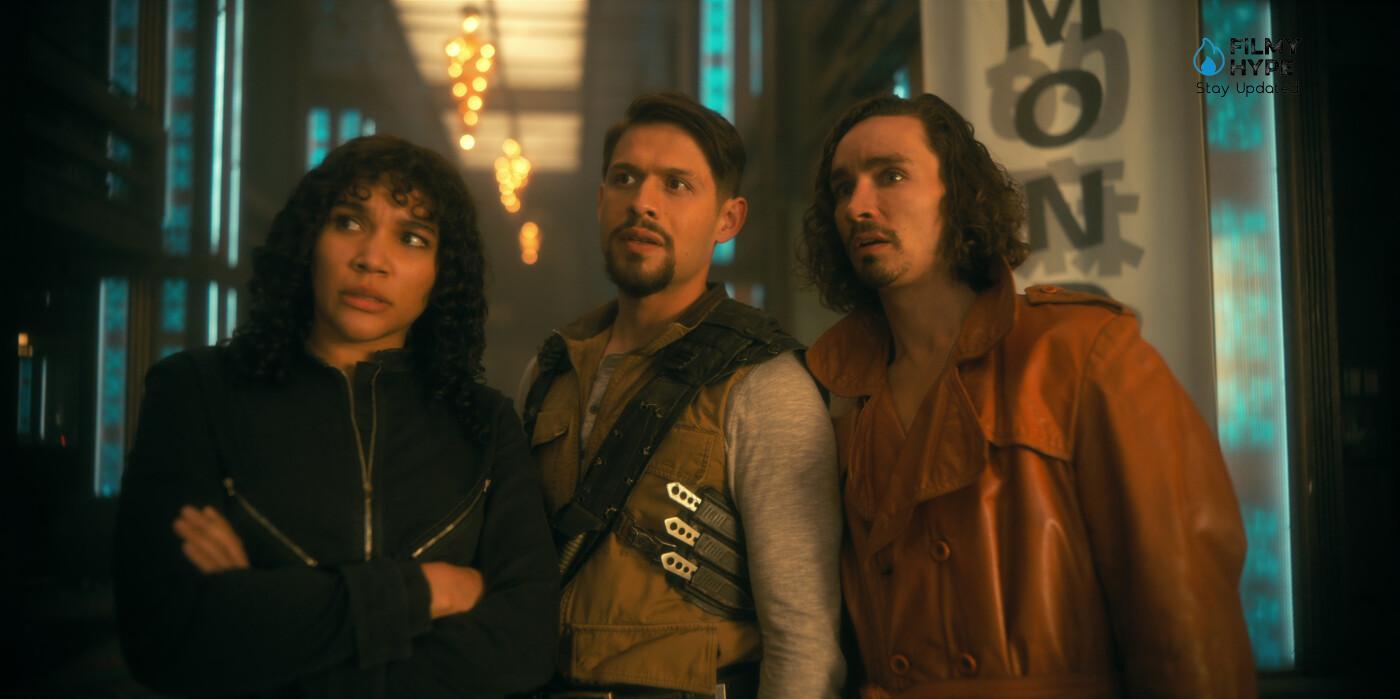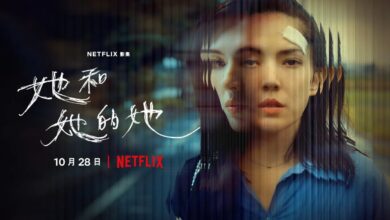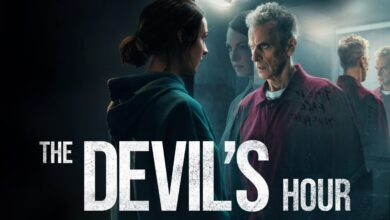The Umbrella Academy Season 3 Review: Dysfunctional Superhero Series Returns With A New And Paradoxical Apocalypse
Cast: Elliot Page, Tom Hopper, David Castañeda, Emmy Raver-Lampman and More
Director: Jeremy Webb
Streaming Platform: Netflix (click to watch)
Filmyhype.com Ratings: 4/5 (four stars)
The Umbrella Academy Season 3 Review: There’s no two without three. After archiving a couple of apocalypses triggered by the uncontrollable Vanya between our days and 1963, the Hargreeves family has managed to return to modern times to destroy them again. What happened in the sweet sixties in Dallas has destabilized reality, changing history. The Umbrella Academy no longer exists and has never existed: in its place, the more “commercial” and contemptuous Sparrow Academy, also made up of 7 members and founded by the eccentric billionaire and adventurer Reginald Hargreeves. The prologue quickly clarifies what happened and the third and enthralling season of The Umbrella Academy kicks off with an animated touch on the notes of Footloose (what a scene!), Introducing us to Reggie’s seven sparrows and their bizarre peculiarities.

The Umbrella Academy created by Steve Blackman and based on the comics of Gerard Way and Gabriel Bà returns to Netflix in great shape for a new and paradoxical end of the world. So much news that the show is ready to introduce to its loyal audience and so much care and fidelity with which it has chosen to do so, first keeping the very heart of the series alive and unique: its magnificent and dysfunctional protagonists. Therefore, the indisputable and appreciated virtues of the product remain intact, but at the same time, it fails to make up for the various shortcomings that it has continued to carry around for years. A solid and invigorating balance that keeps the entire construction of the work on its feet, today more intimate and revealing than yesterday, where comparisons and resolutions are the order of the day and there is no time when illogic is not at home.
The Umbrella Academy Season 3 Review: The Story
The new entry of this third story arc are the superheroes of Sparrow Academy, thus bringing the number of “specials” in circulation to 14. While in the comics these characters have just been introduced by Way, the series gets to develop them earlier and thus overcome the work of the author – who remains the show’s executive producer. Apart from Ben, who despite being the exact copy of the character’s Umbrella counterpart is temperamentally the opposite (an upbeat, pedantic and grumpy number 2), the other six members of Sparrow are welcome outsiders, some darker than others. In order are Marcus, Fei, Alphonso, Sloane, Jayme and Christopher. Some are strong, those with telekinetic powers, those who command crows, those who spit hallucinations and those who are just a weird talking black cube.
Their abilities are unique exactly those of their rivals, but it is the family bond that differs above all from that of Umbrella. In this sense, the third season turns into a confrontation between the best family, among those who deserve to remain in the universe while everything around them begins to happen something strange and perhaps irreversible. In all this, the new performers have a decidedly reduced charisma compared to our aficionados, even if in some cases the relational balance set up by the intertwining and the profuse alchemy of the scene create a relaxed and curious atmosphere that does not take long to strike the viewer. But it is also true that their screen time is designed in a functional way to the corresponding narrative contribution, in some cases non-existent and others more occasional than necessary.
While convincing and being a delightful novelty, the members of the Sparrow Academy are not entirely essential, even if their essence is all in the perspective of the different family dynamics. Sparrows and umbrellas thus move on an imaginary chessboard according to moves that they often cannot control, at the mercy of the worst threat ever faced before. It even scares Number 5 and forces the beloved Klaus (Robert Sheehan was born for the role) to come face-to-face with a long-retarded self, while Luther and Diego are captured by each other. Among them to undergo a radical change of pace is Allison, a reason that makes her storyline the least strong-say weak would be disproportionate-and changes, not a little the perspective of her character of her, coming to divide.
The Umbrella Academy Season 3 Review And Analysis
The Umbrella Academy remains a mainstream work with a strong independent soul, cloaked in charm and mystery, exasperated in the environments and forms, in the clothing, and the plot. There is nothing that is “normal” in the Netflix series, which is indeed now more than in the past a glorious manifesto of diversity and inclusion, not cold and mechanical but warm and deliberate, almost as if it needed expression. It is home and nourishment for those who want to be free and themselves, as demonstrated by Elliot Page’s splendid management of the transition path and the inclusion of his Viktor within the narrative, without unhinging anything but working with the very soul of the character, his psychology, his past.
The Hotel is a cardinal for the economy of the story but also a “theatrical” space where these magnificent characters and their relationships – conflicting or not – can blossom even more. The series recovers this more intimate dimension except for the necessary and present excursions outside the walls of the Sparrow Academy and the Hotel, but basically, it is as if there was a continuous rebound between these two places. The second is then a constant surprise and scenographically impressive for the attention to detail and the desire to make it alive and vibrant with personality, all the more necessary given the centrality of the building. Therefore, Umbrella Academy represents a welcoming lodge for those who feel rejected or confused, lost or distant from the world, just like the Obsidian Hotel welcomes its refugees without asking questions, suspended in time as if it were a strange and immobile entity.
In short, the Blackman series is a confirmation, both in the vices and in the merits. The step is that of a project that now has its own specific and tested dimension, so self-confident in an inventive key and in the relational writing between the characters that it even appears vain, especially when it exploits the aforementioned theatrical structure to make up for some substantial lack of budget, necessary and still not received as it should give real prominence to effects, direction and contents.
He feeds voraciously on a certain inadequacy that is now inexcusable after three seasons and then dismisses it in a sprawling way despite a six-year-long success, but at the same time, he manages to convince without reservations for his creative direction, for the ideas put in place, for a cyclical imaginary apocalyptic that constantly changes skin and structure while remaining the same. Umbrella Academy is the exact definition of a serial security net of conscious gaps that will never be remedied. It’s a little bit Klaus, a little bit Number 5, and a little bit Diego too. It is different and out of the ordinary and is accepted as it is, shiny but imperfect like the raw obsidian in whose black and enveloping reflections it is possible to admire even oblivion.
The Umbrella Academy Season 3 Review: The Last Words
The Umbrella Academy Season 3 is a confirmation of the goodness of the Netflix series for better or for worse. Steve Blackman’s show is today more than yesterday a great and important manifesto to diversity and inclusion, where its direct and magnificent and dysfunctional protagonists alone represent the heterogeneous beauty that makes each of them unique and special, from the extrovert Klaus to the small-big Number 5.
There are also members of the Sparrow Academy, curious and intriguing rival outsiders, while the plot is this time more solid and well-articulated, net of a set of absurdities hatched by the showrunner (and the contribution by Gerard Way) to generate some healthy and fun chaos. The narrative centrality of the Obisidian Hotel and its interiors – when spacious and when labyrinthine – are also essential to make up for a now unjustifiable lack of budget that does not help to level the direction and effects of the product, which in any case settle on the discreet. The heart remains its protagonists, their dialogues, and their relationships. In this sense, the writing is always and, in any case, centered and at times brilliant, as well as for the respective characterizations and interpretations. A project capable of remaining true to itself and continually reinventing itself is Unmissable.

https://www.youtube.com/watch?v=hs6alRuY1UU





